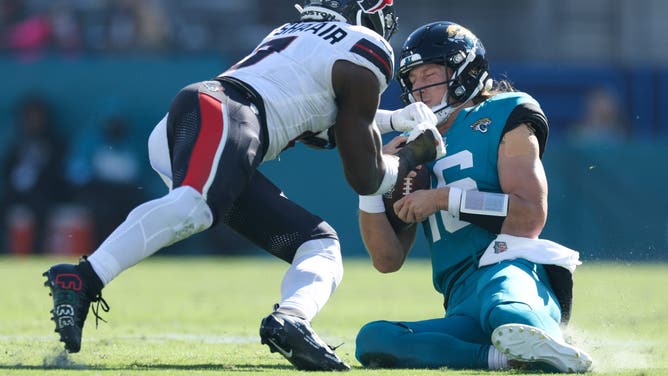Azeez Al-Shaair Epitomizes Victim Culture By Blaming Criticism For Dirty Hit On 'Racism And Islamophobia'
The NFL suspended Houston Texans linebacker Azeez Al-Shaair for an illegal hit on Jacksonville Jaguars quarterback Trevor Lawrence last Sunday. As Lawrence slid to avoid contact, Al-Shaair targeted the quarterback's head with his forearm.
Find a dirtier play in the NFL this season you will not:
And yet, Al-Shaair claims he is the victim; not Trevor Lawrence. During his semi-apology address to Lawrence on Monday, Al-Shaair called the criticism of the hit both "racist" and "Islamophobic."
"To the people who I've been called every single name in the book from reporters with their hands ready for a story to find their villian, to racist and islamophobic fans and people, you don't know my heart nor my character which I don't need to prove to any of you," Al-Shaair wrote.
Not exactly.
Al-Shaair is not criticized because he is black and a practicing Muslim. He is criticized because he cheap-shots players on the field and risks seriously injuring them.
It wasn't just his shot at Lawrence. Al-Shaair has a history. As FS1 host Emmanuel Acho noted, Al-Shaair choked Tom Brady on the field in 2022, provided late hits on Caleb Williams and Tony Pollard this season, and punched Roschon Johnson after a play.
Other than that, he just plays football.
Al-Shaair is a dirty player. He has made that quite clear. Whether he deserves a one-game, three-game, or season-long suspension is for you to debate. The more damning development is him using his race and Muslim religion as an obvious get-out-of-jail-free card.
Azeez Al-Shaair epitomizes victim culture.

JACKSONVILLE - Jacksonville Jaguars quarterback Trevor Lawrence (16) slides down in front of Houston Texans linebacker Azeez Al-Shaair (0) in the second quarter at EverBank Stadium on Dec. 1, 2024. Photo: Nathan Ray Seebeck-Imagn Images
We live in a society of wannabe victims. There's no greater path to the top than convincing the public that you are a victim. And usually, you don't have to cite any experiences that made you a victim. Rather, you just need to remind folks that you belong to a group that claims to have once been marginalized.
That's what Al-Shaair tried doing in his letter.
Cleveland Browns defensive end Myles Garrett used the same tactic in 2020 after he swung his helmet at Pittsburgh Steelers quarterback Mason Rudolph, which would've been considered an assault off the field. But as the media piled on, Garrett told ESPN's Mina Kimes that Rudolph shouted a racial slur his way.
"He called me the N-word," Garrett said to Kimes after the fact. "He called me a 'stupid N-word.'"
Rigghtt.
And not one of the other players, most of whom were black, in the scuffle heard him say that. Anyway, Garrett's accusation sparked an NFL investigation that "found no such evidence" of Rudolph yelling the N-word.
Shocker.
But Garrett and Al-Shaair understand the game. Once they play those cards, the criticism of them largely subsides. It worked for Garrett. Afterward, ESPN pundits Ryan Clark and Josina Anderson came to his defense. Likewise, the tone around the coverage of Al-Shaair has shifted less negatively since his letter.
That's how the industry works. Most members of the sports media would rather neglect their duties as journalists than denounce a player with the race firmly in their back pocket.
Notably, there is an industry-wide reluctance to hold Lamar Jackson accountable for his poor play in big games because he was supposedly viewed negatively as a black quarterback during the draft process. Even Nick Wright, an avowed left-wing culture warrior, can admit that.
"Lamar Jackson was so unfairly maligned at the beginning of his career, that now folks have an allergy to treating him the way we treat Aaron Judge," Wright told Dan Patrick earlier this month.
"Unbelievable, remarkable, historic regular-season player, who it’s not that he’s not the same in the playoffs, every single year is his absolute worst in the playoffs. Every athlete of my lifetime that has fit that profile is treated with heavy, heavy skepticism, except for Lamar."
Put simply, if Nick Bosa had hit Lamar the way Al-Shaair hit Lawerence, Mina Kimes, Bomani Jones, and Elle Duncan would call for his permanent expulsion from the league.
They haven't had much to say about Al-Shaair since he reminded them that he is a victim.
It's good to be a victim.